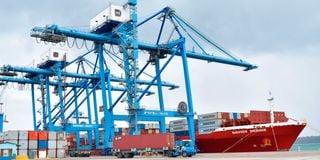Dubai Port World makes comeback in Dongo Kundu bid

Panama-flagged container ship Lisa offloads cargo at the newly constructed container Terminal 2 at the port of Mombasa in June last year.
After failing to reach an agreement to develop three commercial ports with the Kenyatta administration, Emirati firm Dubai Port World (DP World) has now expressed interest in developing the Dongo Kundu Special Economic Zone (SEZ) in Mombasa.
Last year, DP World sought concession licences to run and operate various infrastructure components in Mombasa, Lamu and Kisumu ports. The company is the latest to express an interest in developing a section of the Dongo Kundu SEZ.
Kenya Ports Authority (KPA) said the project has attracted interest from many companies as it works around the clock to deliver within the project one year.
Acting KPA Managing Director John Mwangemi yesterday met with a delegation from DP World led by Head of Project Portfolio Group Planning and Project Management Haism Ezz Elarab.
The team, according to KPA, is conducting a feasibility study on the motor vehicle import business for local, transit and transhipment markets.
Business model
Mr Mwangemi was joined by General Manager, Corporate Services Mr Edward Kamau were in talks that also touched on ongoing infrastructure projects at the port of Mombasa and the envisaged business model at the port of Lamu.
“KPA is currently focused on capacity expansion of the port of Mombasa with the construction of Berth 23 on the offing. By partnering with initiatives like the Mombasa Port Development Project, the facility had enhanced its capacity and efficiency,” said Mr Mwangemi.
DP World came into the limelight early last year after retired President Uhuru Kenyatta’s administration engaged it to upgrade facilities at Mombasa, Lamu and Kisumu ports.
According to documents dated January 2022, Kenya was considering signing a concession agreement with DP World to undertake the development, operation, management and expansion of transport logistics services in the country on various components.
If the agreement was implemented, DP World would have been given the power to run at least four berths at the port of Mombasa, the three Lamu Port completed berths and three special economic zones. But in July the same year, the government tore up the deal. During the campaigns, then Deputy President William Ruto accused his boss, Mr Kenyatta, of trying to sell the port to foreign entities.
Deputy President Rigathi Gachagua said an audit was underway following reports that the previous administration had offered DP World a tender for the development, operation and management of the country’s four ports.
“In the sunset days of the last regime, there were games being played and I want to thank some of the KPA board of directors for their patriotism because they refused to allow theft of the port.,” Mr Gachagua said.
According to KPA, apart from a Tanzanian gas company; Taifa Gas which commissioned a $130.5 million liquefied petroleum gas terminal last week, several companies have developed an interest in Berth 23.
Speaking after meeting with Japan International Cooperation Agency (Jica) Executive Senior President Yamada Junichi, Mr Mwangemi said KPA and Jica have a strategic partnership to complete the project.
The Dongo Kundu SEZ project includes the creation of a free trade zone, a free port, a logistics hub, and an industrial zone. The project is part of Kenya’s industrialisation plan, spanning 10 years and is boosted by the revised draft SEZ Regulations (2019) that offer incentives to companies operating in the zone.
Among the incentives in the new regulations are exemption from VAT, reduced corporate tax from 30 per cent to 10 per cent for the first 10 years and 15 per cent for the next 10 years, exemption from taxes and duties payable under the Customs and Excise Act (2014), the Income Tax Act (1974), the EAC Customs Management Act (2004), and stamp duty, and exemption from county-level advertisement and licence fees.




